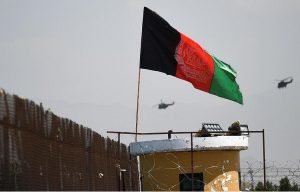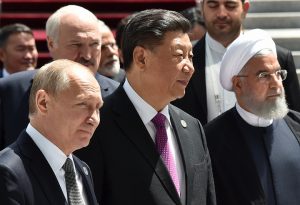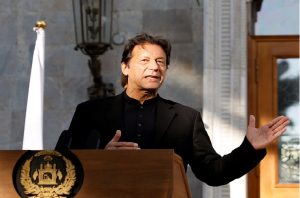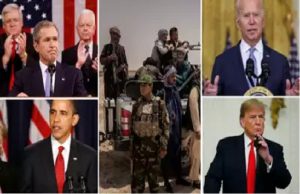09-09-2021
By SJA Jafri + Bureau Report + Agencies
 ISLAMABAD/ BEIJING/ MOSCOW/ WASHINGTON/ KABUL: US President Joe Biden says Pakistan, Iran, China and Russia are working to negotiate and reach an agreement with the Afghan Taliban on certain issues.
ISLAMABAD/ BEIJING/ MOSCOW/ WASHINGTON/ KABUL: US President Joe Biden says Pakistan, Iran, China and Russia are working to negotiate and reach an agreement with the Afghan Taliban on certain issues.
His comment came hours after the Taliban announced details of its interim government in Afghanistan.
Biden said he was certain China would try to work out an arrangement with the Taliban after the group seized power in Afghanistan on August 15.
Asked if he was worried that China would fund the group, which is sanctioned under U.S. law, Biden told reporters, “China has a real problem with the Taliban. So they’re going to try to work out some arrangement with the Taliban, I’m sure. As does Pakistan, as does Russia, as does Iran. They’re all trying to figure out what do they do now.”
Earlier, a US State Department spokesman had expressed concern over the Taliban’s announcement of an interim government and said the Taliban would be tested by their actions, not their words.
Zabihullah Mujahid, the spokesman of the Afghan Taliban, had recently said that the future of Afghanistan’s development is in the hands of China.
In an interview to an Italian newspaper, Mujahid said that China is considered Afghanistan’s neighbor and most important partner. He had said the new Afghanistan will seek China’s help to revive and rebuild its economy.
Mujahid said that the Taliban also wanted to establish strong diplomatic and trade relations with Russia. He said Russia had fully supported the Taliban for the establishment of world peace.
 The United States and its Group of Seven allies have agreed to coordinate their response to the Taliban, and Washington has blocked the Taliban’s access to Afghanistan’s reserves, most of which are held by the New York Federal Reserve, to ensure they live up to their pledges to respect women’s rights and international law but experts say much of that economic leverage will be lost if China, Russia or other countries provide funds to the Taliban.
The United States and its Group of Seven allies have agreed to coordinate their response to the Taliban, and Washington has blocked the Taliban’s access to Afghanistan’s reserves, most of which are held by the New York Federal Reserve, to ensure they live up to their pledges to respect women’s rights and international law but experts say much of that economic leverage will be lost if China, Russia or other countries provide funds to the Taliban.
A new Taliban interim government drawn exclusively from loyalist ranks formally began work Wednesday, with established hardliners in all key posts and no women, despite previous promises to form an inclusive administration for all Afghans.
As they transition from militant force to governing power, the Taliban are already facing opposition to their rule, with scattered protests, many with women at the forefront, breaking out in cities across the country.
After leading a virtual 20-nation ministerial meeting on the Afghan crisis, US Secretary of State Antony Blinken said any international legitimacy for the Taliban government would have to be “earned”.
In the capital Kabul, a small rally on Wednesday was quickly dispersed by armed Taliban security, while Afghan media reported a protest in the northeastern city of Faizabad was also broken up.
Hundreds protested on Tuesday, both in the capital and in the city of Herat, where two people at the demonstration site were shot dead.
 Late Wednesday, the Taliban moved to snuff out further protests, issuing an order saying prior authorization will be needed from the justice ministry and warning that violators “will face severe legal action”.
Late Wednesday, the Taliban moved to snuff out further protests, issuing an order saying prior authorization will be needed from the justice ministry and warning that violators “will face severe legal action”.
And “for the time being”, demonstrations are not allowed, at all.
The announcement of the government Tuesday night was a key step in the Taliban’s consolidation of power over Afghanistan, following a stunning military victory that saw them oust the US-backed administration on August 15.
Notorious for their brutal and oppressive rule from 1996 to 2001, the Taliban had promised a more inclusive government this time.
However, all the top positions were handed to key leaders from the movement and the Haqqani network, the most violent faction of the Taliban known for devastating attacks.
‘Same as the old Taliban’
Mullah Mohammad Hassan Akhund, a senior minister during the Taliban’s reign in the 1990s, was appointed interim prime minister, the group’s chief spokesman announced.
Mullah Yaqoob, the son of the Taliban founder and late supreme leader Mullah Omar, was named defence minister, while the position of the interior minister was given to Sirajuddin Haqqani, the leader of the feared Haqqani network.
The movement’s co-founder Abdul Ghani Baradar, who oversaw the signing of the US withdrawal agreement in 2020, was appointed deputy prime minister.
 None of the government appointees were women.
None of the government appointees were women.
“We will try to take people from other parts of the country,” spokesman Zabihullah Mujahid said, adding that it was an interim government but Bill Roggio, managing editor of the US-based Long War Journal, tweeted: “The new Taliban, same as the old Taliban”.
Legitimacy must be ‘earned’
The Taliban had made repeated pledges in recent days to rule with greater moderation than they did in their last stint in power but Zabihullah announced the reinstatement of the feared Ministry for the Promotion of Virtue and Prevention of Vice, which from 1996 to 2001 was responsible for arresting and punishing people for failing to implement the movement’s restrictive interpretation of sharia.
Even as the Taliban consolidate power, they face the monumental task of ruling Afghanistan, which is wracked with economic woes and security challenges including from the Islamic State group’s local chapter.
In Germany, Blinken said the ministerial talks were the “starting point for international coordination” on how to deal with the Taliban.
Among the countries that participated in the virtual meeting were European allies and historic Taliban backer Pakistan.
“The Taliban seek international legitimacy. Any legitimacy, any support, will have to be earned,” Blinken told reporters.
The European Union said the “caretaker” government failed to honor vows from the new rulers to include different groups.
China meanwhile said it welcomed the end of “three weeks of anarchy”, adding it “attaches great importance” to the announcement of an interim government.
 Foreign ministry spokesman Wang Wenbin said China hoped the Taliban would “pursue moderate and steady domestic and foreign policies, resolutely crack down on all kinds of terrorist forces, and get along well with all countries, especially neighboring countries”.
Foreign ministry spokesman Wang Wenbin said China hoped the Taliban would “pursue moderate and steady domestic and foreign policies, resolutely crack down on all kinds of terrorist forces, and get along well with all countries, especially neighboring countries”.
Qatar, the central intermediary between the Taliban and the international community in recent years, said the Taliban had demonstrated “pragmatism” of late.
“Let’s seize the opportunities there,” Assistant Foreign Minister Lolwah al-Khater told media but she stopped short of announcing formal recognition of the government.
Former president Ashraf Ghani, who fled the country on August 15 as the Taliban entered Kabul, apologised Wednesday to the Afghan people for how his rule ended.
Ghani said he left at the urging of the palace security in order to avoid the risk of bloody street fighting, and again denied stealing millions from the treasury.
“I apologize to the Afghan people that I could not make it end differently,” he said on Twitter.
Taliban have agreed to allow 200 foreigners stranded in the country to leave via charter flights from Kabul airport, according to a US official who spoke anonymously.
The Taliban had earlier assured nearly 100 countries that they would assist in evacuating the citizens left in Afghanistan after a chaotic US withdrawal that saw thousands of foreign nationals being airlifted in the last two weeks of August.
 This happened following the ouster of the Ashraf Ghani government in Kabul.
This happened following the ouster of the Ashraf Ghani government in Kabul.
According to a news report, Taliban authorities have agreed to let 200 American civilians and other foreign nationals who remained in Afghanistan after the end of the US evacuation operation, to depart.
The report stated that they were pressed to allow the departures by US Special Representative Zalmay Khalilzad.
The departures were expected on Thursday.
The ousted Afghan government’s ambassador to Tajikistan Wednesday said Panjshiri leader Ahmad Shah Massoud and former Afghan Vice President Amrullah Saleh have not fled Afghanistan and their resistance forces are still fighting the Taliban.
Zahir Aghbar, envoy to Dushanbe under the government of ousted Afghan President Ashraf Ghani, told a news conference in Tajikistan’s capital that he was in regular contact with Saleh and that the resistance leaders were out of general communication for security reasons.
“Ahmad Massoud and Amrullah Saleh have not fled to Tajikistan. The news that Ahmad Massoud has left Panjshir is not true; he is inside Afghanistan,” Aghbar said.
“I am in constant contact with Amrullah Saleh, who is currently in Panjshir and running the Islamic Republic of Afghanistan’s government,” he said.
The Taliban swept to power last month and they said they have captured the Panjshir valley, the last holdout province, though the resistance has not conceded defeat.
 Pressmediaofindia
Pressmediaofindia




